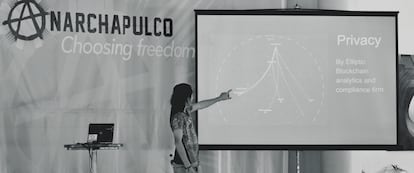Anarcho-capitalism in Acapulco: The libertarian orgy that ended in crime
Among TED-style talks, alcohol and drug binges, an expat community represented the worst of the ideology; ‘The Anarchists,’ on HBO Max, offers a closer look

By now, the recipe for a streaming docuseries is quite clear: a cast of characters, some eccentric, some demented (at least one or two should instinctively arouse the audience’s sympathy); a peculiar location; a common belief or mission; and some kind of criminal element, be it a murder or a massive swindle. Hopefully, the resulting content will hold the interest of the audience for six episodes of just under an hour each. The Anarchists, on HBO Max, does not stray far from the formula, but the story is surprising enough to feel new. Think of it as something of a Fyre Festival with Ayn Rand readers and people who knew what cryptocurrencies were back in 2015.
That was the year when Todd Schramke, a documentary filmmaker who worked as an event videographer and a Lyft driver, began to notice on Facebook that many of the people he knew in ancap circles (the anarcho-capitalists are people who believe in dismantling the state so that capitalism can grow uninhibited), whom he had met in his teens at punk rock concerts, were going to Acapulco, a Mexican coastal city that nowadays is more famous for its high crime rate – a consequence of the cartel wars – than for the Elvis movies that were shot there back in the 1960s. Many went there to attend an unusual event: a congress of libertarian anarchists called Anarchapulco led by an arrogant Canadian millionaire named Jeff Berwick. A lot of them were even staying there to live. Schramke could sense a story.
More than Berwick or the ideology itself, what caught Schramke’s attention was the assortment of personalities that were there and their raw passion, he explains via email. Both he and his life partner, producer/composer Kym Kylland, appear on camera throughout the series; but unlike other documentaries of this style, you will not see them react in disbelief to some of the things the anarcho-capitalists do and say (like burning books in a bonfire surrounded by children yelling “Fuck the state!” as seen in the opening scene). They maintain their position as neutral observers and keep the narration as a last resort, preferring to use the voices of the protagonists.

And what protagonists they are. Anarchapulco has its fair share of colorful characters. In addition to Berwick himself, who gives interviews from a glass-walled mansion, there are the Freemans, Nathan and Lisa, a software designer (at a company with the suspicious name of Red Pills Now) and a teacher with two unschooled young children (unschooling is not the same as homeschooling; the Freemans say they would rather take their children to a porn movie set than to a public school). Around 2015, they decided to quit their jobs and their suburban home in Atlanta, sell everything, and leave for Acapulco to join the anarcho-capitalist community.
It did not take long for the couple to take over the Anarchapulco organization. They moved the event from a rather shabby room to a hotel with a pool, and turned it into a mix of TED Talks (except the talks were about topics like Bitcoin or the need to stop paying taxes) and the Girls Gone Wild shows that used to air on MTV in the early 2000s with thousands of drunken white college kids dancing on their spring break at the beaches of Cancun.

Early in the series it becomes clear who the natural enemies of the Freemans are going to be. Another white couple, John Galton and Lily Forester, have a very different understanding of anarcho-capitalism. They also arrived in Acapulco from the United States, but not by crossing the border on a car loaded with beachwear and surfboards like the Freemans: instead they snuck in through Tijuana at night to avoid the border controls, because at that time, in 2017, the police were already looking for them; they were facing 25 years in prison in the US for illicit drug possession.
What follows is, in a way, a spoiler, in case someone watches the series without having first googled the libertarian community of Acapulco. Two years after arriving in the city and settling on the hill – the two owners of a local cafe, among the few Mexicans who appear in the documentary, tried to warn them not to settle in that area, as it was considered dangerous – and when Galton and Forester had already split from Anarchapulco to set up their own anarchist congress (one with less consumerist tendencies) Galton was shot to death in his house. The case acquired certain notoriety in the American media because it brought that entire community of book-burning expats to light. It is believed that it was some local narcos who murdered Galton as a warning not to intervene in the city’s businesses, as he grew marijuana in his house. His girlfriend, who provides some of the most magnetic testimonies of the series, with her Shelley Duvall-esque appearance and her Daria-like voice, blamed the murder on Paul Preport, one of the shadiest characters in the gang, an ex-military man and unofficial dealer for the conference attendees. Whether he had something to do with the case or not, nobody will never know for sure, because Propert committed suicide in 2019.

Even though Donald Trump’s name is not mentioned much, Trumpism is the clear context of this entire saga. Many of the ancaps who paid more than $500 to attend the congress at the hotel (plus another $500 for access to the “investor conference” – or about $250 for a pack of experiences with illegal substances) ended up joining the ranks of that movement. As a matter of fact, Anarchapulco had guests like Judge Andrew Napolitano, a regular on the Fox network. And both the anti-vaccine movement and QAnon, the conspiracy theory that stained the last elections and led to the taking of the Capitol on January 6, 2021, trace their roots back to that mixture of paranoid-libertarian beliefs about the ills of the state that would have made 19th-century anarchist Mikhail Bakunin shudder.
Schramke and Kylland were there with their cameras for years, trying not to interfere, looking for an alchemy between “empathy and skepticism” – according to the director – and doing their best to be curious and open-minded towards all the participants. Their ultimate goal was to draw a study of that community and observe its evolution as events unfolded. That made them see them at their most vulnerable, which at times took a toll on Schramke, he relates. He says that he trusts the audience to discern all the ideas that are presented and that, deep down, the anarcho-capitalists of Acapulco were a peaceful group opposed to voting and taxes.
Nathan Freeman, the software designer who went to Acapulco with his family and took over the event, died last year of colon cancer. His widow, Lisa, is still in the country with her three children (the third one, Ira Belle, was born in Mexico) and works as a nutritionist and personal trainer. Berwick no longer lives in Acapulco; he is currently living in Mexico City and has abandoned his party lifestyle for a life with no alcohol, no sugar, and no caffeine. He has a podcast called Anarchast and several paid content platforms where he continues to promote cryptocurrencies and rail against his two enemies: the state and central banks.
Tu suscripción se está usando en otro dispositivo
¿Quieres añadir otro usuario a tu suscripción?
Si continúas leyendo en este dispositivo, no se podrá leer en el otro.
FlechaTu suscripción se está usando en otro dispositivo y solo puedes acceder a EL PAÍS desde un dispositivo a la vez.
Si quieres compartir tu cuenta, cambia tu suscripción a la modalidad Premium, así podrás añadir otro usuario. Cada uno accederá con su propia cuenta de email, lo que os permitirá personalizar vuestra experiencia en EL PAÍS.
¿Tienes una suscripción de empresa? Accede aquí para contratar más cuentas.
En el caso de no saber quién está usando tu cuenta, te recomendamos cambiar tu contraseña aquí.
Si decides continuar compartiendo tu cuenta, este mensaje se mostrará en tu dispositivo y en el de la otra persona que está usando tu cuenta de forma indefinida, afectando a tu experiencia de lectura. Puedes consultar aquí los términos y condiciones de la suscripción digital.








































